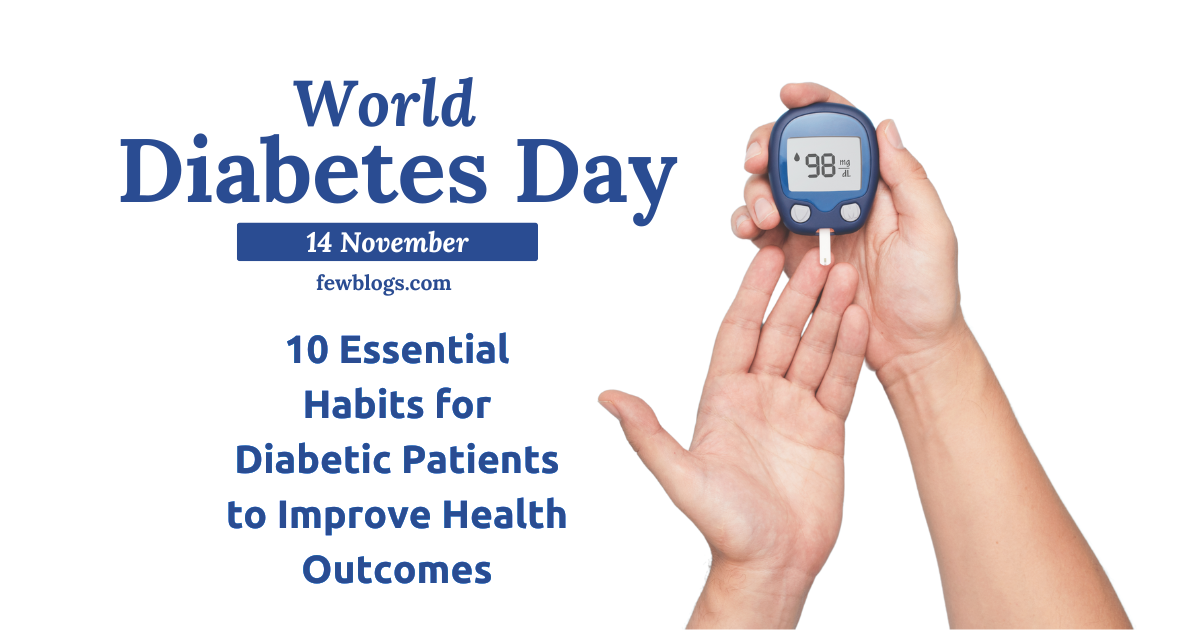Essential Habits for Effective Diabetes Management
Discover effective diabetes management strategies with healthy habits for diabetes and expert tips for managing diabetes effectively. Empower your health today!
HEALTH TIPS
Pravash Pujari
11/14/20233 min read


Introduction
Living with diabetes can be challenging, but by adopting ten essential habits, diabetic patients can significantly improve their health outcomes. These habits focus on various aspects of daily life, including monitoring blood sugar levels, following a balanced diet, exercising regularly, taking prescribed medications, staying hydrated, getting enough sleep, managing stress levels, quitting smoking, limiting alcohol consumption, and attending regular check-ups with healthcare providers. By incorporating these habits into their daily routine, diabetic patients can better manage their condition and lead healthier lives.
1. Monitor Blood Sugar Levels Regularly
Regular monitoring of blood sugar levels is crucial for diabetic patients. It provides valuable information about how their body is responding to their diet, exercise, and medications. By keeping track of their blood sugar levels, patients can identify patterns, make necessary adjustments, and prevent complications.
2. Follow a Balanced Diet Low in Sugar and Carbohydrates
Diet plays a significant role in managing diabetes. Diabetic patients should focus on consuming a balanced diet that is low in sugar and carbohydrates. This means incorporating plenty of fruits, vegetables, lean proteins, and whole grains into their meals. It is also important to limit the intake of sugary snacks, processed foods, and sugary beverages.
3. Exercise Regularly to Maintain a Healthy Weight
Regular exercise is beneficial for everyone, but it holds particular importance for diabetic patients. Engaging in physical activity helps maintain a healthy weight, improves insulin sensitivity, and lowers blood sugar levels. It is recommended to aim for at least 30 minutes of moderate-intensity exercise, such as brisk walking or cycling, most days of the week.
4. Take Prescribed Medications as Directed
Following the prescribed medication regimen is crucial for managing diabetes effectively. Diabetic patients should take their medications as directed by their healthcare provider. It is important not to skip doses or make any changes without consulting a healthcare professional.
5. Stay Hydrated
Proper hydration is essential for overall health, including for diabetic patients. Drinking an adequate amount of water helps regulate blood sugar levels and prevents dehydration. It is recommended to consume at least eight glasses of water per day, or more if engaging in physical activity or in hot weather.
6. Get Enough Sleep
Adequate sleep is vital for everyone, but it holds additional importance for diabetic patients. Lack of sleep can affect blood sugar control and insulin sensitivity. It is recommended to aim for 7-9 hours of quality sleep each night to support overall health and well-being.
7. Manage Stress Levels
Stress can have a significant impact on blood sugar levels and overall health. Diabetic patients should find healthy ways to manage stress, such as practicing relaxation techniques, engaging in hobbies, or seeking support from friends and family. Regular exercise and getting enough sleep also contribute to stress management.
8. Quit Smoking
Smoking is detrimental to overall health, and it poses additional risks for diabetic patients. Smoking increases the risk of cardiovascular complications, which are already elevated in individuals with diabetes. Quitting smoking is one of the most beneficial habits diabetic patients can adopt to improve their health outcomes.
9. Limit Alcohol Consumption
While moderate alcohol consumption may be acceptable for some individuals, diabetic patients should be cautious. Alcohol can interfere with blood sugar control and may interact with certain medications. It is important to consult with a healthcare provider regarding alcohol consumption and its potential impact on diabetes management.
10. Attend Regular Check-ups with Healthcare Providers
Regular check-ups with healthcare providers are essential for diabetic patients. These appointments allow for monitoring of blood sugar levels, assessing overall health, and making any necessary adjustments to the treatment plan. It is important to communicate openly with healthcare providers and address any concerns or questions.
Conclusion
By incorporating these ten essential habits into their daily routine, diabetic patients can significantly improve their health outcomes. It is important to remember that managing diabetes is a lifelong journey, and these habits should be maintained consistently. With proper self-care and support from healthcare professionals, diabetic patients can lead healthier lives and effectively manage their condition.
Disclaimer: The health tips provided on this blog are for informational purposes only and should not be construed as medical advice. Always consult with a qualified healthcare professional before making any changes to your diet, exercise routine, or treatment plan. Your health is important, and individual needs may vary. The author and publisher are not liable for any consequences arising from the use or misuse of information presented on this blog.
